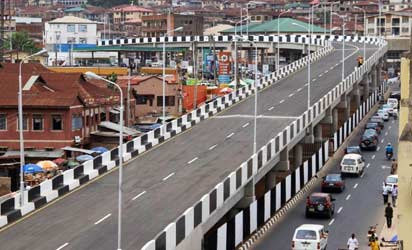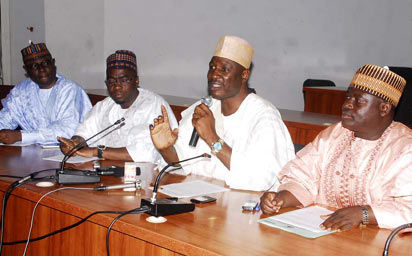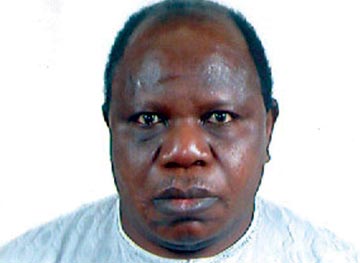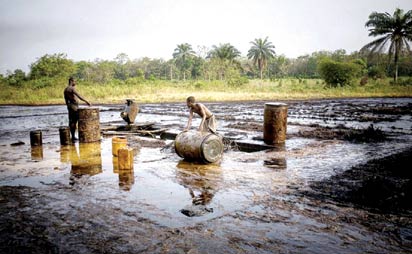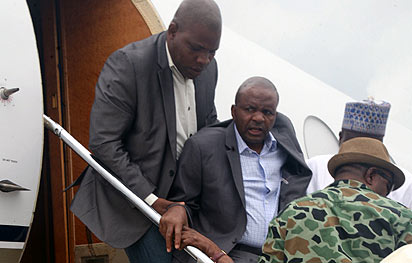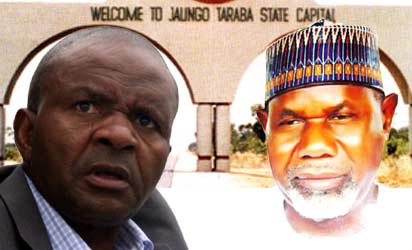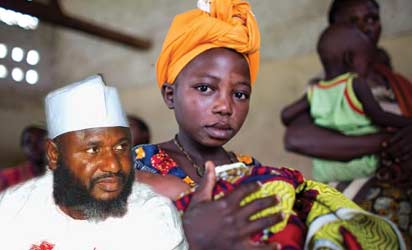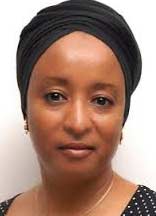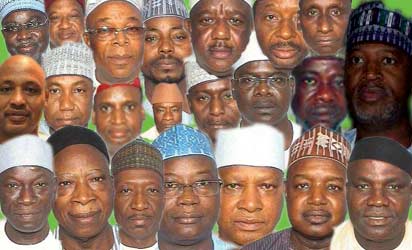ARAB leaders are generally known to be despotic and brutal, with a high sense of insecurity. Syria's President, Bashar Al Assad is no different from the likes of Saddam Hussein, Muammar Gaddafi, Hosni Mubarak, Ben Ali Omar Al Bashar and others that build their security round their inner circles of family members and cronies.
Bashar al-Assad, who inherited Syria’s presidency in 2000 after his father’s death, has surrounded himself with people who are either related to him or are members of his minority Alawite community.
Maher al-Assad, Republican Guard chief
Maher Al Assad is the youngest brother of the president but the second most powerful man in Syria. He commands the elite Republican Guard, whose six brigades protect the regime from domestic threats, and commands the fourth armoured division, considered one of the army’s best-equipped and highly-trained. Maher who was born in 1967, studied at the University of Damascus and joined the military with his older brother Basil who died in 1994.He later followed his into the military.
[caption id="attachment_411913" align="alignright" width="175"]
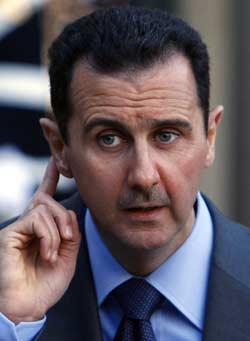 Bashar al-Assad[/caption]
Bashar al-Assad[/caption]On the death of his father Hafiz many people thought he was to be the successor but he was too young this paved way for Bashar to be chosen. In 2000, shortly after Bashar became president, Maher became a member of Baath Party’s second highest body, the Central Committee. Before his promotion to general, Maher commanded a Republican Guard brigade. This provided him with valuable military experience that allowed him to establish personal ties with many officers.
He has a reputation for being excessively violent and emotionally unstable, and allegedly shot and wounded his brother-in-law, Asef Shawkat. In 2000, Maher is reported to have helped persuade Bashar to put an end to the political openness seen during the first few months of his rule - the short-lived “Damascus Spring”. In 2005, Maher and Shawkat were both mentioned in a preliminary report by UN investigators as one of the people who might have planned the assassination of the former Lebanese Prime Minister, Rafik Hariri.
Rami Makhlouf
A first cousin of Mr Rami Makhlouf is the first cousin of Bashar al-Assad and unarguably the most powerful economic figure in Syria. Born in 1969, Mr Makhlouf took over the businesses built up by his father, Mohammed, the brother of Hafez al-Assad’s wife, Anisa Makhlouf. After Bashar became president in 2000, Mr Makhlouf’s financial empire expanded. He has been accused severally of corruption and cronyism in Syria.
Ali Mamluk, director of the National Security Bureau (NSB)
Lt Gen Mamluk who was born in 1946, is the director of the Baath Party Regional Command’s National Security Bureau (NSB), which co-ordinates the work of Syria’s intelligence agencies and formulates recommendations for the president. In practice, however, the agencies operate with a high degree of autonomy, answerable mainly to the president.
Between 2005 and 2012, he was head of the General Security Directorate (State Security), where he was involved in some of the most sensitive issues concerning Syria. His agency had repressed internal dissent, monitored individual citizens, and had been “involved in the Syrian regime’s actions in Deraa, where protesters were killed by Syrian security services”, it alleged. President Assad asked Gen Mamluk to lead the National Security Bureau after its director, Gen Hisham Ikhtiar, died after a bomb attack on its headquarters on 18 July 2012.
The blast also killed Mr Assad’s brother-in-law, Deputy Defence Minister Gen Assef Shawkat, Defence Minister Gen Daoud Rajiha, and former Defence Minister Hassan Turkomani, who was in charge of the security forces’ crisis management office.
Abdul Fatah Qudsiya, deputy director of the National Security Bureau
Gen Qudsiya - an Alawite born in 1953 - served as head of the Republican Guard’s security office, and as personal secretary to the president. Gen Qudsiya who became deputy director of the National Security Bureau (NSB) in July 2012. Was formerly the head of Military Intelligence, the paramount security agency in Syria.
He replaced the president’s late brother-in-law, Assef Shawkat, as military intelligence chief he was head of Air Force Intelligence. In 2008, Gen Qudsiya was appointed to lead the security committee investigating the assassination of Hezbollah military commander Imad Mughniyeh in Damascus.
Gen Qusiya was appointed Gen Ali Mamluk’s deputy at the National Security Bureau following the bomb attack on its headquarters in Damascus on 18 July, Syrian officials and Lebanese media reported.
Rafiq Shahada, head of Military Intelligence
Major General Rafiq Shahada is the head of Military Intelligence, the paramount security agency in Syria, which has a reputation for ruthless efficiency and whose leaders have wielded considerable influence over presidents. Gen Shahada was promoted to chief of Military Intelligence in July 2012 after his predecessor, Abdul Fatah Qudsiya, became deputy head of the National Security Bureau.
Jamil Hassan, head of Air Force Intelligence
Major General Jamil Hassan replaced Abdul Fatah Qudsiya as head of Air Force Intelligence in 2009. Though smaller than Military Intelligence, AFI is seen by some as the elite agency of Syria’s intelligence empire.
Eastern governorate
The agency owes its power to Hafez al-Assad, who was air force chief before coming to power in a coup. Gen Hassan, an Alawite, previously served as a security official in the eastern governorate of Deir al-Zour.
Mohammed Dib Zaitoun, head of the General Security Directorate
Maj Gen Zaitoun, a Sunni born in 1951, is reportedly the new head of the General Security Directorate (GSD), which is the most powerful civilian intelligence agency and plays an important role in quelling internal dissent.
Tasked primarily with safeguarding against and preventing domestic subversion and organised crime, the GSD is organised into three branches - internal security, external security and Palestinian affairs. It controls the civilian police and the border guards, and has primary responsibility for surveillance of the Baath Party, the state bureaucracy and the general population.
Gen Zaitoun was previously head of the Political Security Directorate (PSD) between 2009 and 2012, and before then deputy head of the GSD.
Gen Zaitoun became head of the GSD in July 2012 following the bomb attack on the National Security Bureau in Damascus which killed four senior security chiefs.
Rustum Ghazali, head of the Political Security Directorate
Gen Ghazali is the head of the Political Security Directorate, a civilian agency that is responsible for monitoring organised political activity, including surveillance of registered parties and political publications. It also has a regional surveillance brief, covering Arab, Palestinian and Israeli affairs.
Born in 1953, he is a former chief of Syrian Military Intelligence in Lebanon, and was in the post when Rafik Hariri was assassinated. Gen Ghazali assumed command in 2002, and was the “implementing agent of Syrian policies in Lebanon” until the Syrian withdrawal in 2005.
In July 2012, Gen Ghazali was appointed head of the PSD following the bomb attack on the National Security Bureau in Damascus.
Hafez Makhlouf, head of the General Security Directorate.
Col Makhlouf is head of the Damascus branch of the General Security Directorate, the overarching civilian intelligence service in Syria.
Childhood friend
Born in 1971, he is a maternal cousin and childhood friend of President Bashar al-Assad, and the brother of Rami Makhlouf.
Col Makhlouf is perhaps best known for being one of the two survivors of the high-speed car crash in 1994 that killed the president’s elder brother, Basil, who was being groomed to succeed their father, Hafez.
In 2007, the US treasury department designated him an individual “furthering the Syrian regime’s efforts to undermine Lebanese democracy” and froze his assets. It alleged that he had “supported the reassertion of Syrian control or otherwise contributed to Syrian interference in Lebanon”. Syrian troops withdrew from Lebanon in April 2005 after a 29-year military presence.
In May 2011, the EU imposed sanctions on Col Makhlouf, saying he was “close to Maher al-Assad” had been “involved in violence against demonstrators” as head of the GSD’s Damascus branch.
The US treasury department announced new sanctions against him later that month, saying he had been “given a leading role in responding to protests in Syria, and was heavily involved in the Syrian regime’s actions in Deraa, where protesters were killed”.
Opposition activists have said Col Makhlouf enjoys greater influence over the president than the head of the GSD, Ali Mamluk.
Mohammed Nasif Kheirbek, deputy vice-president for security affairs
Gen Kheirbek is a member of the Alawite Kalabiya tribe, to which Bashar al-Assad belongs. Their families are also connected by marriage - a relative is married to one of Rifaat al-Assad’s daughters.
The general, who was born in 1937 and is reported to have medical problems, has long served the Syrian regime and remains an influential adviser to the president. He was a very close adviser to the late Hafez al-Assad before being appointed deputy director of the General Security Directorate (GSD) in 1999.
He served in the position until 2006, when he was named deputy vice-president for security affairs. The next year, the US froze his assets for “contributing to the government of Syria’s problematic behaviour”, which it said included support of international terrorism, the pursuit of weapons of mass destruction, and the undermining of efforts in Iraq.
A leaked US diplomatic cable described Gen Kheirbek as Syria’s “point-man for its relationship with Iran”. It said designating him could “heighten Syrian and regional concerns about the [government’s] willingness to accommodate an expansionary Iranian agenda”.
In May 2011, the EU imposed sanctions on Gen Kheirbek, saying he had been “involved in violence against the civilian population”.
Dhu al-Himma Shalish, head of Presidential Security
Gen Shalish is Bashar’s first cousin and head of Presidential Security, an elite force. In June 2011, the EU imposed sanctions of him, saying he had been “involved in violence against demonstrators”.
He once owned SES International, which the US government alleged in 2005 was a “vehicle to put military goods into the hands” of former Iraqi leader Saddam Hussein and his regime.
He and his brother, Assef, who managed SES, acted as a “false end user” for Iraq, helping to procure defence-related goods for the Iraqi military before the US-led invasion, it added. SES allegedly provided exporters with end-user certificates indicating Syria was the final destination, and then shipped them illegally to Iraq. He was said to have provided close personal assistance to Saddam’s oldest son, Uday.
Gen Shalish’s influence within the president’s inner circle is believed to have increased since the beginning of the uprising. Joshua Landis of the University of Oklahoma told the New York Times in July 2012 that he was now a key financier and organiser of feared pro-Assad militiamen known as “shabiha”, who activists say have been used by the government to intensify the crackdown on protesters and commit atrocities on its behalf.
Gen Shalish and his immediate family were “looked at as lowlife no-goodniks a year ago, but today they have been catapulted into the ranks of the inner circle because they are willing to do the dirty work for the regime,” Mr Landis said. “There are only so many family members.”
Zuhair Hamad, deputy head of the General Security Directorate
Maj Gen Hamad is deputy to Mohammed Dib Zaitoun, the head of the powerful General Security Directorate.
He previously led its Special Intelligence Unit, he was responsible for monitoring newspapers, television channels and websites covering Syria, and writing daily reports for high-ranking officials. Opposition sources said he often summoned journalists for “clarification” on their stories, and accused him of often resorting to blackmailing them to limit criticism of the regime.
Human rights activists say Gen Hamad played a major role in the campaign of arrests against opposition and independent figures which intensified in the months leading up to the recent anti-government unrest.
In November 2011, the EU accused Gen Hamad of responsibility “for the use of violence across Syria and for intimidation and torture of protesters” and imposed sanctions on him.
All the signals from Washington and London suggest that military action against Syria is now a strong possibility. Contingency plans are being drawn up, potential target lists are being reviewed and various military assets are being moved into position.
The US Navy is re-positioning several vessels, including four cruise missile-carrying destroyers in the eastern Mediterranean and probably a missile-firing submarine.
